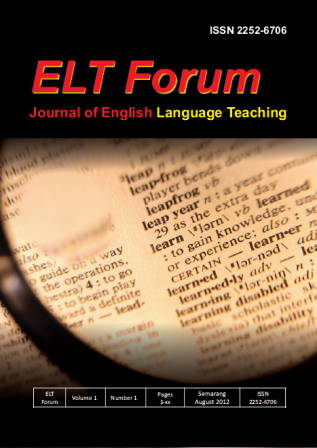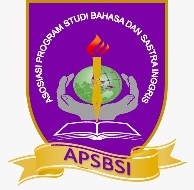THE EFFECTIVENESS OF SEMANTIC MAPPING STRATEGY TO IMPROVE STUDENTS` VOCABULARY MASTERY
Abstract
The purpose of this study was to investigate the effectiveness of semantic mapping strategy to improve students` vocabulary mastery. The research design of this study was a quasi experimental design. The population was the seventh grade students of SMP Negeri 4 Batang in the academic year of 2013/2014. The samples consisted of 72 students, which divided into two groups, they were experimental group and control group. In order to collect data about students’ vocabulary mastery improvement and responses toward the implementation of semantic mapping strategy, the writer used vocabulary test and questionnaire. During the treatment, students in experimental group used semantic mapping strategy, while students in control group used wordlists strategy. In the pre test results, the mean score of the experimental group was 62,91 and the control group was 63,19. However, there was improvement in post test results. The analysis of the test result showed that the students` improvement of experimental group was higher than control group. In the post test, the mean score of the experimental group was 82,08 while the control group got 76,38. Based on statistical analysis by using t-test formula, indicated that the t-test was 3,29 and t-table was 1,99. It means that t-value was higher than t-table (3,29 >1,99). As a result, there is a significant difference in vocabulary achievement between the students who are taught by using semantic mapping strategy and those who are taught by using wordlists strategy. Based on the result of this study, the writer concluded that semantic mapping strategy is more effective to be implemented in teaching vocabulary to improve students` vocabulary mastery than wordlists strategy.
References
Arikunto, Suharsimi. 2006. Prosedur Penelitian Suatu Pendekatan Praktik. Jakarta: PT. Rineka Cipta.
Barcroft, J. 2004. Second language vocabulary acquisition: A lexical input processing approach. Foreign Language Annals, 37, 2, 200-208.
Bateman, T.S. and Zeithamai, c.P. 1990. Management: Function and Strategy. Homewood, Ill: Irwin.
Brown, H. Douglas. 2004. Language Assessment: Principles and Classroom Practices. New York: Pearson Education.
Creswell, John W. 2009. Research Design 3rd edition: Qualitative, Quantitative, and Mixed Methods Approaches. USA: SAGE Publications, Inc.
Graves, M. 2008. Instruction on individual words: One size does not fit all. In A. E. Farstrup & S. J. Samuels (Eds.), What research has to say about vocabulary instruction (pp. 56–79). Newark, DE: International Reading Association.
Hatch, E., & Brown, C. 1995. Vocabulary, semantics and language education. Cambridge: Cambridge University Press.
Homby, As. 1995. Oxford Advanced Learner Dictionary. New York: Oxford University Press.
Kamil, Michael L. and Elfrieda H. Hiebert. 2005. Teaching and Learning Vocabulary: Bringing Research to Practice. New Jersey: Lawrence Erlbaum Associates, Inc., Publishers.
Laufer, B. 1997. What’s in a word that makes it hard or easy: Some intralexical factors that affect the learning with words. In N. Schmitt & M,
Michael (Eds.) (1997). Vocabulary: Description, acquisition and pedagogy (pp. 140-155). Cambridge: Cambridge University Press.
Oxford, R. 2001. Research on language learning strategies: Purpose, Methods, Issues. Presentation. Hokkaido University.
Seiler, Marcia Ford & et al. 2013. Indicators of Efficiency and Effectiveness in Elementary and Secondary Education Spending. Frankfort : Legislative Research Commission.
Wintergrest, A. C. DeCapua, A., & Itzen, R. C. 2001. The construct validity of one learning instrument. System , 29, 385- 403.



_.jpg)
_.jpg)




